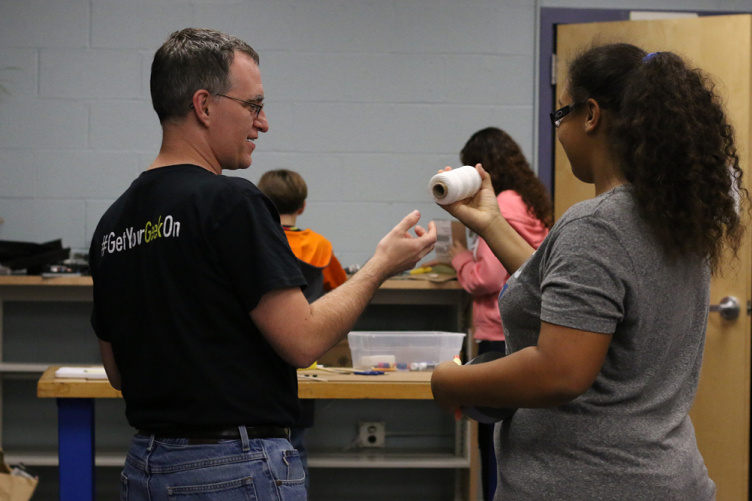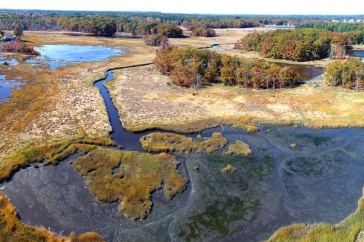
UNH STEM docent Eric Swanson ’99 (left) engages with a student attempting to build a mousetrap car during an afterschool program in Manchester.
“We’re out of glue again,” a student yells from across the room in Manchester’s Hillside Middle School library. He holds an empty hot glue gun in one hand and a small square of cardboard in the other. Two volunteers look up.
Five students are participating in this afterschool class led by Eric Swanson '99 and Bob Ball, who are both volunteer UNH STEM docents. The STEM Docents program started in August in the Manchester area. Docents help provide hands-on STEM training for students. Megan Glenn, UNH Cooperative Extension’s STEM Docent program coordinator, works with the volunteers to translate their science, technology, engineering and mathematics backgrounds into learning opportunities for youth.
“I know the subject, but I didn’t know how to get it across,” says Ball, a retired engineer. “Experts at UNH who know about STEM, know how to put a program together, put the foundation in that I can add my expertise to.”
Swanson is an engineer at Dyn, a Manchester internet performance management company. He signed on as a docent after Cooperative Extension’s science education and outreach coordinator Lara Gengarelly gave a presentation at his company. “Anything involving STEM is crucial to the next generation of our workforce. We need more people in these fields,” he says.
“We circulate and observe. We ask open-ended questions. We don’t give them answers. Copying — that’s not what this is about. So often they don’t have the outlet of being able to explore. The process is the thing.”
As students focus on building mousetrap cars with supplies like compact discs, cardboard, string and plastic tubes, Swanson and Ball move around the room. They seem like two formally trained educators, but it was only a few months ago that they and 10 others received three days of intensive training on how to deliver a STEM curriculum to New Hampshire youth. What makes this program especially powerful is not just the focus on STEM but the manner in which docents run the class.
STEM docents present a task — in this case, to build a car that will travel in a straight line as far as possible — but they go lightly on giving directions. Swanson and Ball purposefully do not provide a sample mousetrap car for the students to mimic. They encourage the students to think for themselves, try out possibilities, record outcomes and redesign as needed.
“Kids are good at exploring,” Glenn says. “It’s important that people can look for answers themselves.”
Swanson explains the way he and Ball work: “We circulate and observe. We ask open-ended questions. We don’t give them answers. Copying — that’s not what this is about. So often they don’t have the outlet of being able to explore. The process is the thing.”
The students gather at a table a few times throughout the class to discuss their progress. During one of the discussions, Ball asks about what is and is not working. Almost in unison the students shout “Glue!” The fascination with glue does not leave Swanson and Ball exasperated but provides another moment to encourage the students to think through their work.
“If there is too much glue what will happen?” Ball asks. The students look at each other and think; then one says they don’t want to put too much weight on their cars and using too much glue might not be best approach.
Ball reassures the students, “You have ideas — maybe they won’t work, maybe they will.”
The students continue building their cars, making changes and noting them. One student rolls her car across the floor, another shows a peer how he'll attach a string to a mousetrap to propel the car. Swanson and Ball keep asking questions, never giving answers.
Over the next year, the STEM Docent program will seek more volunteers in the Manchester area and more in-school and afterschool programs for volunteers to work in. Later, the program will expand into the Seacoast and North Country regions of New Hampshire, with future hopes of establishing cohorts of volunteers throughout the entire state.
If you’re interested in learning more about STEM Docents, contact Megan Glenn at megan.glenn@unh.edu or attend an informational session on Dec. 13 at UNH Manchester. The next training session starts January 19; it will focus on how to teach coding using an inquiry-based method.
-
Written By:
Kyle Belmont | Cooperative Extension | kyle.belmont@unh.edu
















































